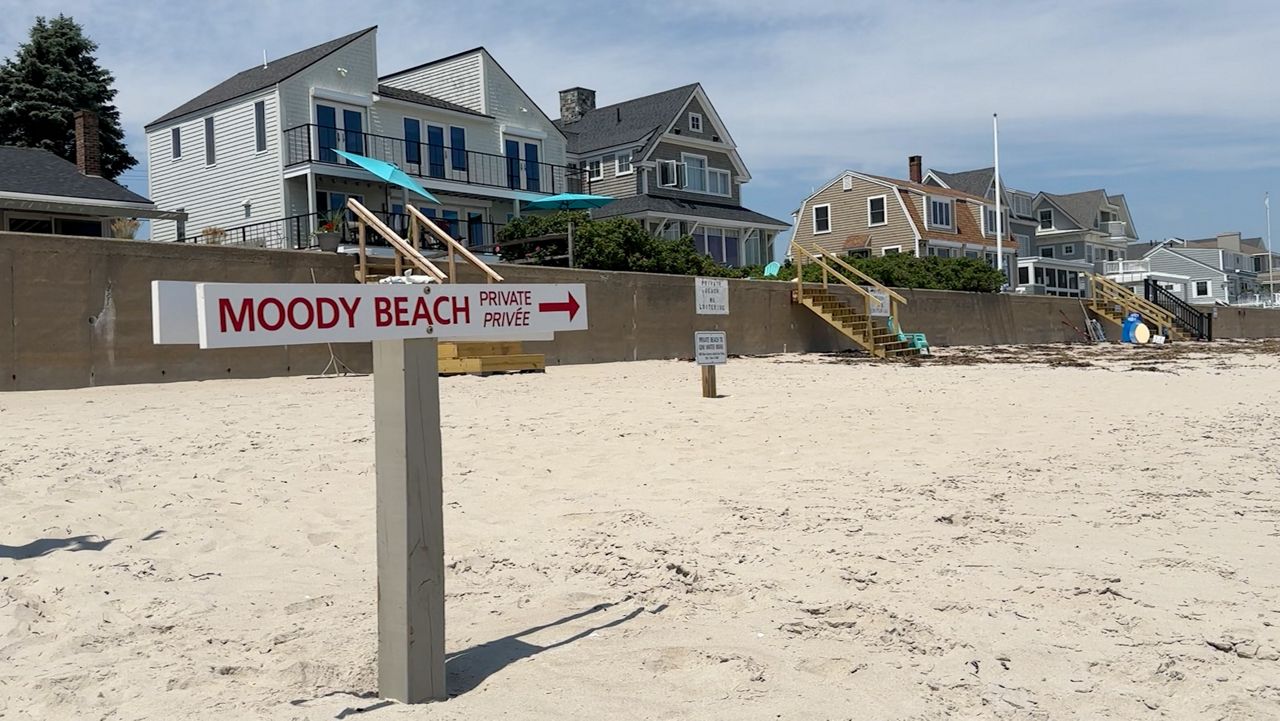A dispute years in the making over public access to Moody Beach in Wells is bubbling over with a new court case that could lead to a showdown in the Maine Supreme Judicial Court, challenging a 35-year-old ruling on the issue.
In legal terms, the argument concerns an old-school, colonial-era law clashing with Maine’s current state constitution, and differing opinions on which matters more. In practical terms, it’s about whether beachfront property owners in Wells should be allowed to keep the public off the beaches in front of their homes.
The current lawsuit, Peter Masucci et al vs. Judy’s Moody, LLC et al, was first filed in April 2021 by a coalition of non-beachfront property owners and business owners in Wells, all calling for public access to Moody Beach.
According to background material in court records, residents of Moody – a coastal neighborhood in Wells – who live on Moody Beach can point to deeds that show their property lines go right down to the water, which includes segments of the beach there.
That means, the beachfront property owners argue, they have the right to control and even restrict access to the sand on their property.
Whether the law agrees is somewhat murky. Those deeds and property lines were drawn before Maine was officially a state, during an era when what is now Maine was part of Massachusetts. Some property records, according to court documents, may even date back to 17th-century common law.
In 1820, Maine broke away from Massachusetts and established its own constitution. In many cases, Maine’s new laws overlapped older rules, but one change has given rise to the current fight: sandy beaches, including roughly 35 miles of beaches stretching along Maine’s coast, including Moody Beach, were to be publicly accessible, regardless of claims by property owners.
For nearly 170 years, that change seems to have stood largely unchallenged, until a collection of property owners along Moody Beach took the Town of Wells to court in the 1980s. They argued that even the state constitution couldn’t simply override the rights of property holders.
In 1989, the Maine Supreme Judicial Court agreed, a move that the current lawsuit’s plaintiffs say was in error.
“What private property owners are asserting is that they have a private beach, but they’ve never had a private beach,” said Keith Richard, a Portland-based attorney representing the suit’s plaintiffs. “There’s no such thing as a private beach. The public always has the right to access the beach. The question is, what are the uses that are allowed?”
Richard said the dispute didn’t end with the SJC’s 1989 decision. The conflict, in one form or another, has popped up in similar lawsuits ever since. Since the year 2000 alone, he said, the SJC has issued similar rulings roughly every five years.
For each of those cases, Richard said, there are likely multiple similar cases being heard at the lower court levels.
Over time, Richard said, decisions on those other cases have eroded the impact of the 1989 decision, leading plaintiffs to conclude that now was the time to address it head-on, hence the current lawsuit.
On Thursday, beachgoers flocked to the north side of Ogunquit Beach, which borders Moody Beach. Along the border was a line of dried seaweed and other ocean debris that did not appear to have been naturally placed there.
Just on the other side of the line, signs marked Moody Beach as “private,” with signs along the sea wall indicating, “Moody Beach, Private, No Loitering.”
Even the plaintiff’s lawsuit indicates that beachfront property owners insist they are not strictly enforcing the signs’ warnings. One beachfront property owner, speaking at a May 21 Wells Select Board meeting on the topic, asserted that he didn’t want to stoke conflict with local residents.
“There are a lot of people in this room that I consider friends on both sides of this issue,” he said. “My hope is that after this, that we remain friends.”
By contrast, Richard alleged that beachfront property owners, in fact, do not hesitate to call police if they feel people are trespassing on their property. While he could not recall the date, he alleged to have video documentation of police forcing children playing baseball on the sand to leave.
“There is an ongoing conflict on our beaches, not just Moody Beach – everywhere, that is annual (and) it is unpleasant,” he said. “Police are being called because kids are playing ball games, there is signage that makes people feel uncomfortable. It is an open confrontation that has only gotten worse.”
Wells Select Board Chairperson John MacLeod III, speaking at the May 21 meeting, said residents have appealed to town officials to take some kind of action. MacLeod said the board spent several months meeting with attorneys, and ultimately decided not to make any major local decisions since the court case was ongoing.
“The board recognizes that this is an evolving issue, which is why it is deciding to take a careful, measured, step-by-step approach to avoid actions that could be destabilizing for all on this beach,” he said.
MacLeod did announce, however, that the board and town government were taking the side of the public, even going as far as to file an amicus brief in the case.
In layman’s terms, Richard said, that means the town is officially documenting its support for the plaintiffs.
“It’s very helpful, I think, because the court needs to hear from the government on the front lines,” he said.
To get to a resolution will take months. Richard said his office officially filed his brief on June 14, and he and the defendants could be exchanging briefs and responses through October, meaning the SJC may not get to hear the case until around the end of the year.






)
